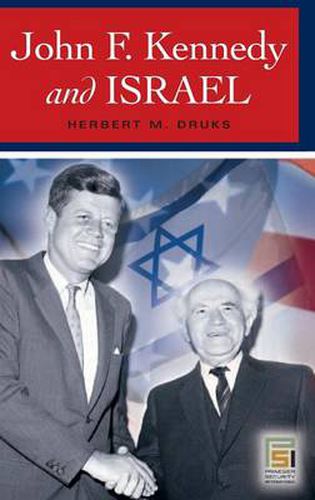Readings Newsletter
Become a Readings Member to make your shopping experience even easier.
Sign in or sign up for free!
You’re not far away from qualifying for FREE standard shipping within Australia
You’ve qualified for FREE standard shipping within Australia
The cart is loading…






John F. Kennedy entered the White House hoping to make America and the world a better and safer place in which to live. Through diplomacy, he wanted to achieve a settlement of the East-West tensions and to bring about a peaceful resolution to such issues as the Israeli-Arab conflict. Although his provision of defensive HAWK anti-aircraft missiles, in response to Russian, French, and British arms sales to the Arabs, made him the first President to supply arms to Israel, Kennedy feared both exacerbation of the arms race and the proliferation of nuclear weapons. While he remained an honest and loyal friend to Israel, he also attempted to further America’s relationship with the Arab states and to encourage a settlement of the Arab refugee issue.
Kennedy was an independent thinker who learned how to rely upon his own best judgment and intelligence rather than upon his father or officials like Dean Rusk or Allen Dulles. Kennedy ultimately agreed to regular consultations between Israeli and American military personnel, but he would not agree to a dual alliance nor would he allow America to become Israel’s main source of military equipment. The author contends that it was this precarious and uncertain diplomatic and military situation that encouraged Israel to develop its own defense industries and to investigate the possibilities of producing its own nuclear weapons systems.
$9.00 standard shipping within Australia
FREE standard shipping within Australia for orders over $100.00
Express & International shipping calculated at checkout
John F. Kennedy entered the White House hoping to make America and the world a better and safer place in which to live. Through diplomacy, he wanted to achieve a settlement of the East-West tensions and to bring about a peaceful resolution to such issues as the Israeli-Arab conflict. Although his provision of defensive HAWK anti-aircraft missiles, in response to Russian, French, and British arms sales to the Arabs, made him the first President to supply arms to Israel, Kennedy feared both exacerbation of the arms race and the proliferation of nuclear weapons. While he remained an honest and loyal friend to Israel, he also attempted to further America’s relationship with the Arab states and to encourage a settlement of the Arab refugee issue.
Kennedy was an independent thinker who learned how to rely upon his own best judgment and intelligence rather than upon his father or officials like Dean Rusk or Allen Dulles. Kennedy ultimately agreed to regular consultations between Israeli and American military personnel, but he would not agree to a dual alliance nor would he allow America to become Israel’s main source of military equipment. The author contends that it was this precarious and uncertain diplomatic and military situation that encouraged Israel to develop its own defense industries and to investigate the possibilities of producing its own nuclear weapons systems.